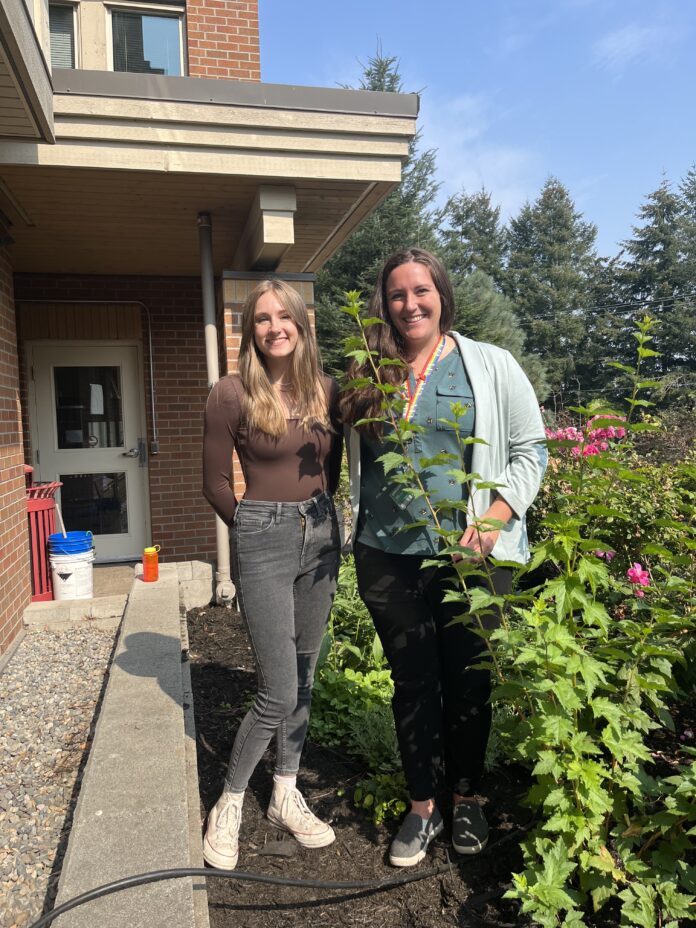This summer, a pollinator garden was planted and created behind the Lá:lem te Baker student housing to help preserve different pollinator species in the area. Sustainability coordinator Jennifer Martel and co-op student Cameron James helped plan out and create the pollinator garden, along with various volunteers and faculty support. Reaching out to several different nurseries and planting native plants in the garden, Martel and James were busy bringing this project to life. Martel and James reflected on their experiences and gave a brief tour of the pollinator garden.
“Preserving the land is really an important part of sustainability in general, not just for our own generations, but for future generations as well,” said Martel when asked about what inspired the project.
“And for students to be able to get engaged and learn about pollinators and the importance of having them on campus, I think too, is a big part of it as well,” James added.
According to Martel, their decision to plant a pollinator garden was influenced by climate factors such as the heat domes and the flooding in B.C. that caused the deaths of several pollinators.
“[When] people often think of pollinators, they think of bees, but we also have different birds, other insects, mice and other rodents, bats as well. And all of them were greatly affected by the heat dome. And then not even five months later, we had major flooding, which again, killed millions more pollinators,” said Martel.
In the planning process, they decided to only plant native plants to help pollinators thrive. Another key component was determining how many plants could realistically fit in the plot of land they had available. They were also aided by biology professor Alan Reid, who has a wealth of knowledge that helped Martel and James determine which native plants to put in the garden as well as the layout.
They also planted a herb garden in the same area, and students living in Lá:lem te Baker can take the different herbs to use for their own nourishment.
“We did a lot of research on making sure that there [were] different colours, shapes, and sizes of all [types of] plants to make sure that they attract all kinds of pollinators,” said James.
According to Martel, the most interesting aspect of this project for her was how hard it was to find resources for creating and planting the pollinator garden. Martel and James had help during this process and about 15 to 20 volunteers helped put together the pollinator garden.
When asked what the hardest aspect of the project was, Martel and James both agreed that laying down the mulch was the most difficult and challenging part. They did not have as many volunteers available as they had hoped since it was during the peak of the heat wave.
Martel said that mulch has the dual purpose of ensuring the ground and roots of the plants are warm enough during the winter season and stop all the water from evaporating in the summer. Martel reflected that when they were laying down the mulch, the main concern was to keep everyone helping safe from the extreme heat.
According to Martel, contrary to popular belief, honey bees are not a native species. They are originally from Europe. However, there are 800 native bee species alone in Canada and 4,000 in North America out of a total of 20,000 species around the world.
“[To] be outside every day as part of my routine, going out and watering the garden and checking on it…to have that little bit of break away from the office and actually getting outside is really nice,” said James.
“To see something that you can produce and you can view. It was really rewarding to see all these different little pollinators actually coming to it, it was such a rewarding feeling,” James added.
In the future, they hope to continue working and expanding this project, but cannot share any details yet on their plans. When asked if students can still help volunteer and work on this project, James and Martel suggested they keep an eye out for postings on their Instagram, @sustainableufv, for further opportunities.
Rachel is working towards a BA with a concentration in English and Theatre. She has been employed at The Cascade since Fall 2021 as a Staff Writer and a Jr. News Editor. Currently, she is the sectional News Editor and enjoys meeting and interviewing people as well as taking long walks in nature. Rachel also likes to stay up to date on the latest trends and informs students through her fashion column entitled Campus Fashion.



